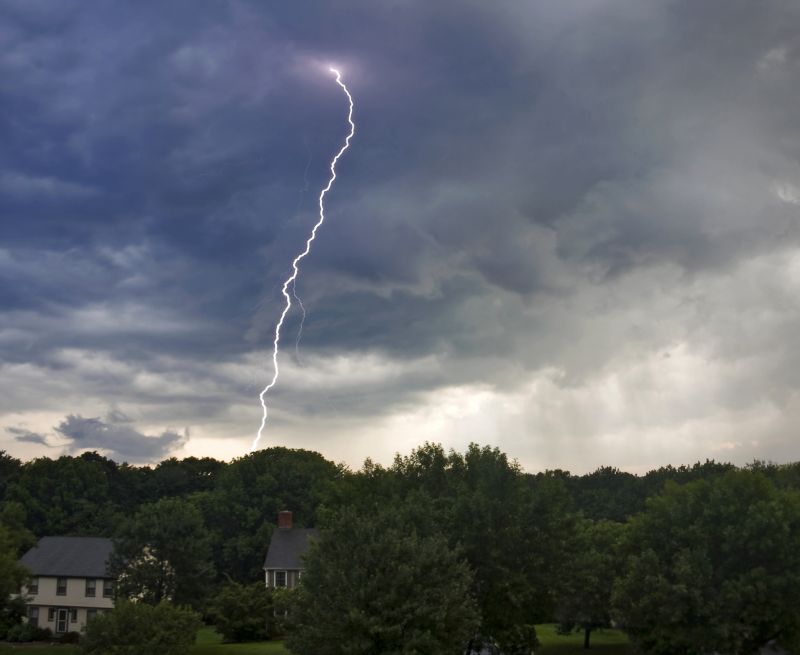Favorite Lightning Protection Devices for Peace of Mind During Storms
Select from trusted lightning protection products that help prevent electrical surges and protect your valuable assets.
 Lightning protection products are essential components for safeguarding electronic devices, appliances, and entire electrical systems from the damaging effects of lightning strikes and power surges. These products work by diverting excess electrical energy safely into the ground, preventing it from passing through sensitive equipment. Proper lightning protection can help minimize the risk of data loss, hardware damage, and costly repairs. When selecting lightning protection solutions, it's important to consider the specific needs of your property, the level of protection required, and compatibility with existing electrical systems.
Lightning protection products are essential components for safeguarding electronic devices, appliances, and entire electrical systems from the damaging effects of lightning strikes and power surges. These products work by diverting excess electrical energy safely into the ground, preventing it from passing through sensitive equipment. Proper lightning protection can help minimize the risk of data loss, hardware damage, and costly repairs. When selecting lightning protection solutions, it's important to consider the specific needs of your property, the level of protection required, and compatibility with existing electrical systems.
Top Overall Option
Whole-House Surge Protector
A comprehensive whole-house surge protector is installed at the main electrical panel to provide broad-spectrum protection against power surges caused by lightning strikes and other electrical disturbances. These devices are designed to handle high-energy surges and divert excess voltage safely into the ground, helping to protect all connected appliances and electronics. When properly installed, a whole-house surge protector can serve as a first line of defense, reducing the risk of damage from external electrical surges. It is an essential component for homes located in storm-prone areas or with sensitive electronic equipment.
Types of Products For Lightning Protections
Whole-House Surge Protectors
Installed at the main electrical panel to provide overall surge protection for the entire household wiring system.
Point-of-Use Surge Protectors
Plug-in devices designed to protect individual appliances and electronic devices from surges.
Lightning Rods
Metal rods installed on buildings to intercept lightning strikes and direct the electrical current safely into the ground.
Grounding Systems
Enhanced grounding solutions that provide a low-resistance path to dissipate electrical energy from lightning strikes.
Surge Suppressors for Data Lines
Devices designed to protect data and communication lines such as Ethernet, coaxial, and telephone cables.
Surge Protective Power Strips
Power strips with built-in surge suppression features for multiple devices in home or office settings.
Transient Voltage Surge Suppressors
Specialized devices that clamp high-voltage transients to protect sensitive electronics.
Outdoor Surge Protectors
Weather-resistant devices designed for outdoor electrical equipment and landscape lighting.
Electrical Panel Protectors
Devices installed directly within electrical panels to provide localized surge suppression.
Portable Surge Protectors
Movable units suitable for temporary protection of equipment during outdoor activities or travel.
Surge Diverters for Solar Systems
Protection devices tailored for solar power installations to safeguard inverters and panels.
Popular Choices
Widely used for comprehensive home protection against electrical surges caused by lightning and other sources.
Commonly found in offices and homes for protecting multiple devices simultaneously.
Popular for outdoor structures, providing a direct path for lightning to the ground.
Frequently used for individual electronics like computers, TVs, and gaming consoles.
Chosen for landscape lighting and outdoor appliances exposed to weather conditions.
Popular for protecting internet, cable, and telephone lines from electrical surges.
Effective for localized surge suppression within the main electrical panel.
Flexible options for temporary or mobile protection needs.
Gaining popularity in renewable energy setups for added system protection.
There are various types of lightning protection devices available, each designed for different applications and levels of protection. Whole-house surge protectors are installed at the main electrical panel to provide a broad shield against power surges originating from outside sources. Point-of-use surge protectors are ideal for individual appliances and electronics, offering localized defense. Additionally, specialized grounding systems and lightning rods can be installed on structures to intercept lightning strikes before they reach the building. Combining multiple protection methods often results in a comprehensive defense strategy, especially in areas prone to frequent thunderstorms.
Quality and reliability are critical factors when choosing lightning protection products. Features such as clamping voltage, response time, and durability influence how effectively a device can handle electrical surges. It's also essential to ensure that products comply with relevant safety standards and certifications. Proper installation by qualified professionals can significantly enhance the effectiveness of these devices, ensuring they function as intended during a lightning event. Regular maintenance and inspections are recommended to keep protection systems in optimal condition over time, providing peace of mind during stormy seasons.
Key Buying Considerations
- Assessment of your property’s exposure to lightning activity and electrical surges.
- Compatibility of the surge protection device with your existing electrical system.
- The level of surge current the device can handle, often indicated in kiloamperes (kA).
- Response time of the device to quickly clamp high-voltage transients.
- Certification and compliance with safety standards such as UL or IEC certifications.
- Ease of installation and whether professional help is recommended or required.
- Durability and weather resistance for outdoor or exposed installations.
- Additional features such as indicator lights, noise filtering, or remote monitoring.
- The number and type of outlets or lines protected by the device.
- Maintenance requirements and the recommended lifespan of the protection device.
- Cost considerations balanced with the level of protection offered.
- Compatibility with sensitive electronics and high-value equipment.
- Availability of warranties or service support from manufacturers.
- Integration with existing home or business electrical safety systems.
- Consideration of future expansion or upgrades to your electrical infrastructure.
This content is for informational purposes only and does not constitute an endorsement or guarantee of any product. Always consult with a qualified professional for proper installation and specific safety recommendations.
